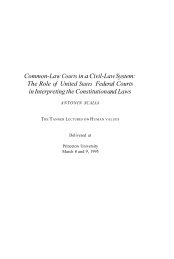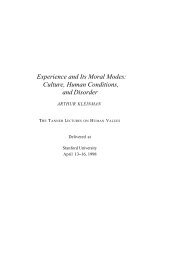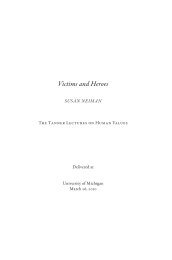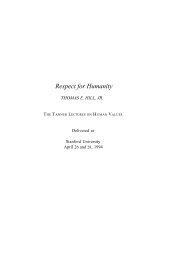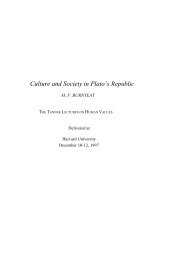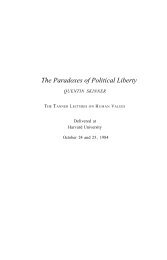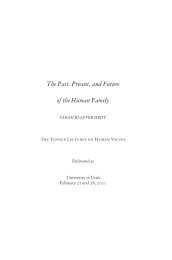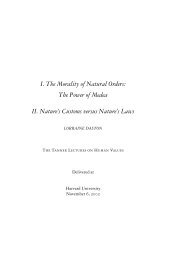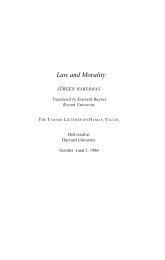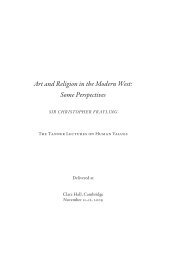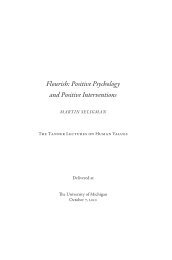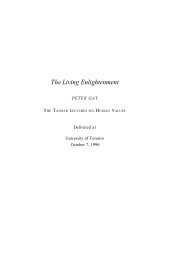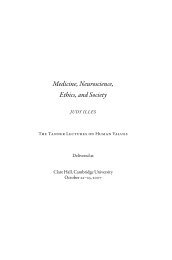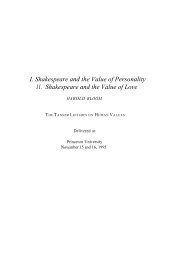82 <str<strong>on</strong>g>The</str<strong>on</strong>g> <str<strong>on</strong>g>Tanner</str<strong>on</strong>g> <str<strong>on</strong>g>Lectures</str<strong>on</strong>g> <strong>on</strong> <strong>Human</strong> <strong>Values</strong>morality.”) 17Be that as it may, the moral demands in questi<strong>on</strong>would be “potential” human rights, whereas the human rightswould in their turn be moral demands, “satisfied” from a legalpoint of view. And I would not give too much importance topurely verbal questi<strong>on</strong>s, since I am well aware that “humanrights,” especially with this name, are such a powerful weap<strong>on</strong>today that it would be foolish to reduce their effectiveness bygiving them the less usual name of “moral demands.” 18If wemust, therefore, be c<strong>on</strong>fr<strong>on</strong>ted by the Janus face of human rights<strong>on</strong>eof whose sides has an ethical profile and the other a legalprofile - I would be c<strong>on</strong>tent simply to request that, in the firstcase, we c<strong>on</strong>sider them “rights” in a merely metaphorical sense,just as, for that matter, jusnaturalism has always d<strong>on</strong>e in speakingof “natural rights.”What I would not so readily agree to is the ambiguous andc<strong>on</strong>fusing name of “moral rights” that they are so often given17 See <strong>on</strong> this point Amelia Valcbrcel, Hegel y la ética (Sobre la superaciön dela “mera moral”), prologue by J. <str<strong>on</strong>g>Muguerza</str<strong>on</strong>g> (Barcel<strong>on</strong>a, 1988).18 Another reas<strong>on</strong> not to do this is the insistence with which the detractors ofhuman rights - and not just their ideology - reject even the name, by invokingagainst them the well-known statement of such an illustrious reacti<strong>on</strong>ary as Joseph deMaistre: “<str<strong>on</strong>g>The</str<strong>on</strong>g>re is no man in the world. In my lifetime I have seen Frenchmen, Italians,and Russians. I also know, thanks to M<strong>on</strong>tesquieu, that <strong>on</strong>e can be Persian: but asto man, I swear I have never met <strong>on</strong>e in my life” (this text, which comes from hisC<strong>on</strong>sidérati<strong>on</strong>s sur la France of 1791, is quoted by A. de Benoist and G. Faye in thedossier <strong>on</strong> Les droits de l’homme that appeared in Eléments 37 [1981]: 5-35. This“nati<strong>on</strong>al-communitarian” point of view would allow for “the rights of [certain]men” (French, Italian, Russian, etc.) but not “the rights of man,” which, nevertheless,need not be-in c<strong>on</strong>trast to what de Maistre believed-an abstract “universalman,” but rather Tom, Dick, or Harry, that is, a c<strong>on</strong>crete “individual,” whosec<strong>on</strong>creteness always outweighs his membership in a specific community, whethernati<strong>on</strong>al or not. For a criticism of what he correctly calls the “fallacy of the c<strong>on</strong>creteman” of de Maistre and his outdated c<strong>on</strong>temporary followers, see LeszekKolakowski, “Warum brauchen wir Kant?” Merkur 9-10 (1981) : 915-24. In histurn, and from a positi<strong>on</strong> not at all sympathetic to human rights understood as “subjectiverights,” Michel Villey has argued interestingly for the “nominalist” andindividualistic origin of this latter noti<strong>on</strong> in “La genèse du droit subjectif chezGuillaume de Occam,” Archives de Philosophie du Droit 9 (1964): 97ff., andLa formati<strong>on</strong> de la pensie juridique moderne (Paris, 1968), chaps. 4 and 5, a thesisI would have no trouble subscribing to if <strong>on</strong>ly I were allowed to see virtue whereverthe author sees vice.
[MUGUERZA] <str<strong>on</strong>g>The</str<strong>on</strong>g> Alternative of Dissent 83today, which is something I want to deal with apart from the questi<strong>on</strong>of jusnaturalism. I prefer to do it this way because not allwho use the name are in debt to, nor would accept the designati<strong>on</strong>of, jusnaturalists. 19And it seems to me at least questi<strong>on</strong>able thata c<strong>on</strong>temporary champi<strong>on</strong> of “moral rights” like R<strong>on</strong>ald Dworkin,so often catalogued this way, should or could be included inthe list.I will not say, as Jeremy Bentham did of natural rights, that“moral rights” are a n<strong>on</strong>sense up<strong>on</strong> stilts, 20 but I will say thatthey are at least a c<strong>on</strong>tradicti<strong>on</strong>. 21 Perhaps neither syntactic norsemantic, as when <strong>on</strong>e speaks of “a square circle” or of “woodenir<strong>on</strong>,” but rather pragmatic, like the <strong>on</strong>e that would pertain if wewere to speak, let us suppose, of “laws of traffic” without therebeing any actual highway code. Before such existed, it wouldmake no sense to say that the small sedan traveling the road “hasthe right” to cross ahead of a big truck approaching from the left.Yet the truth is that according to certain current interpretati<strong>on</strong>s,moral rights are c<strong>on</strong>ceived of precisely as “prior to” any possiblerecogniti<strong>on</strong> of them in legal statutes. Is such an interpretati<strong>on</strong>defensible? Whether it is or not, <strong>on</strong>e must acknowledge that ithas in its favor our use of such expressi<strong>on</strong>s as “I have a rightto . . .” in ordinary language, expressi<strong>on</strong>s that we most often usewithout intending an appeal to any article of the legal statutes.And, despite old Bertrand Russell’s warning about the ordinarinessof being bound by analyses of ordinary language, perhaps it would19 I am not certain, to quote a few examples of philosopher-compatriots, ifProfessor Eusebio Fernandez would at all approve of such a cataloguing (see hisTeoría de la justicia y derechos humanos [Madrid, 1984], esp. 104ff.), but I knowthat Professor Francisco Laporta (see his “Sobre el c<strong>on</strong>cepto de derechos humanos,”in Actas de Ias X Jornadas de Filosofia Juridica y Social, Alicante, December 1987,[in press]) would be vexed with me if I listed him as a jusnaturalist.italics.]20 [<str<strong>on</strong>g>The</str<strong>on</strong>g> words “n<strong>on</strong>sense up<strong>on</strong> stilts” were in English in the original; J.M.’s21 J. Bentham, Anarchical Fallacies, Being an Examinati<strong>on</strong> of the Declarati<strong>on</strong>of Rights Issued during the French Revoluti<strong>on</strong>, in Works, ed. John Bowring (Edinburgh,1838; repr. New York, 1962), 2:500.



